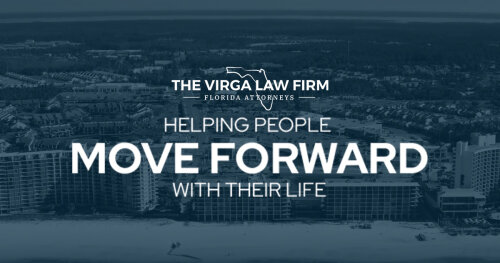Best Collaborative Law Lawyers in Florida
Share your needs with us, get contacted by law firms.
Free. Takes 2 min.
Free Guide to Hiring a Family Lawyer
Or refine your search by selecting a city:
List of the best lawyers in Florida, United States
About Collaborative Law in Florida, United States
Collaborative Law is a unique and increasingly popular approach to resolving family law disputes, such as divorce and child custody, outside of court. In Florida, collaborative law provides a structured process in which both parties work with a team of trained professionals to reach mutually acceptable agreements. Unlike traditional litigation, collaborative law emphasizes cooperation, confidentiality, and open communication. Each party retains a specially trained collaborative attorney, and the goal is to avoid adversarial court proceedings entirely. This approach aims to minimize conflict, preserve relationships, and provide solutions tailored to the family’s specific needs.
Why You May Need a Lawyer
There are several common situations where individuals may benefit from professional legal help in collaborative law processes:
- Divorce or separation, especially when a peaceful resolution is a priority
- Child custody and parenting plan arrangements where ongoing cooperation is necessary
- Negotiating division of assets and debts in a less adversarial setting
- Spousal support or alimony determinations with an emphasis on fairness
- Post-divorce modifications needing amicable solutions
- Same-sex couple or domestic partner separations requiring sensitive resolution
- Addressing complex family business or property division issues
- Preserving privacy, as collaborative law meetings and records are kept confidential
A trained collaborative attorney helps explain your rights, ensures fairness, and facilitates effective communication with the other side and the professional team supporting the process.
Local Laws Overview
Florida has codified the principles of collaborative law in its statutes, specifically under the Collaborative Law Process Act (Florida Statutes Sections 61.55 through 61.58). This law outlines the guidelines and protections for parties engaging in the collaborative law process. Key aspects include:
- Both parties must sign a collaborative law participation agreement
- All communications made during collaborative sessions are privileged and confidential, meaning they cannot be used in court if the collaborative process ends without agreement
- If the collaborative process fails, the attorneys involved must withdraw and cannot represent either party in later court proceedings related to the matter
- The process is voluntary and either party can terminate their participation at any time
- In addition to attorneys, neutral professionals such as financial experts and mental health facilitators can be part of the collaborative team to support the family’s needs
These laws ensure that participation in collaborative law is protected and structured, encouraging honest dialogue and thoughtful solutions.
Frequently Asked Questions
What is the collaborative law process?
Collaborative law is a method for resolving disputes, especially in family law, where both parties work with trained professionals outside of court to negotiate an agreement that works for everyone involved.
How is collaborative law different from traditional divorce?
In collaborative law, the focus is on cooperation and creative problem solving. Both parties commit to resolving their issues without going to court, leading to less adversarial and more personalized outcomes than traditional litigation.
Is the collaborative process confidential?
Yes, Florida law protects the confidentiality of all communications made during the collaborative law process, which cannot be used in court if the process ends without agreement.
Who is involved in the collaborative law process?
Each party has their own collaborative attorney, and neutral professionals such as financial experts, child specialists, and mental health professionals may also participate to support the process.
Can collaborative law be used for child custody disputes?
Yes, collaborative law is commonly used for parenting arrangements and can help parents create customized plans focused on the best interests of their children.
What if the collaborative law process breaks down?
If the process ends without a complete agreement, both collaborative attorneys must withdraw, and the parties will need to hire new counsel to represent them in court.
How long does the collaborative law process usually take?
The timeline varies, but collaborative law can often resolve disputes faster than traditional litigation, sometimes in just a few meetings, depending on the complexity of the issues.
Is collaborative law less expensive than going to court?
Collaborative law can be more cost-effective than litigation because it typically requires fewer hours and avoids lengthy court procedures, though costs vary depending on the needs of each case.
Are collaborative law agreements legally binding?
Yes, once an agreement is reached, it is formalized in writing and can be submitted to the court to become a legally binding order or settlement.
How do I find a collaborative law attorney in Florida?
Look for attorneys listed as trained collaborative professionals through local bar associations or organizations that specialize in collaborative law in your area.
Additional Resources
If you are considering collaborative law in Florida, the following resources may be helpful:
- The Collaborative Family Law Group of Central Florida
- Florida Academy of Collaborative Professionals (FACP)
- Florida Bar Association's Family Law Section
- Local county bar associations with collaborative law committees or listings
- Florida court self-help centers for general information about family law
- Private mediators and mental health professionals trained in collaborative law
Next Steps
If you believe collaborative law may be right for your situation, consider the following steps:
- Research local collaborative law attorneys with training and experience in this area
- Schedule an initial consultation to discuss your case and determine if collaborative law is a good fit
- Ask about the attorney’s process, experience, and fees before making a decision
- Ensure all parties are willing to commit to the collaborative process and sign a participation agreement
- Gather any relevant documents and information, such as financial statements, to assist the collaborative team
- Stay open to honest communication and creative problem solving throughout the process
Collaborative law can offer a respectful and efficient path to resolving some of life’s most difficult transitions. Speaking with a qualified attorney is the best way to understand your options and move forward with confidence.
Lawzana helps you find the best lawyers and law firms in Florida through a curated and pre-screened list of qualified legal professionals. Our platform offers rankings and detailed profiles of attorneys and law firms, allowing you to compare based on practice areas, including Collaborative Law, experience, and client feedback.
Each profile includes a description of the firm's areas of practice, client reviews, team members and partners, year of establishment, spoken languages, office locations, contact information, social media presence, and any published articles or resources. Most firms on our platform speak English and are experienced in both local and international legal matters.
Get a quote from top-rated law firms in Florida, United States — quickly, securely, and without unnecessary hassle.
Disclaimer:
The information provided on this page is for general informational purposes only and does not constitute legal advice. While we strive to ensure the accuracy and relevance of the content, legal information may change over time, and interpretations of the law can vary. You should always consult with a qualified legal professional for advice specific to your situation.
We disclaim all liability for actions taken or not taken based on the content of this page. If you believe any information is incorrect or outdated, please contact us, and we will review and update it where appropriate.
Browse collaborative law law firms by city in Florida
Refine your search by selecting a city.















